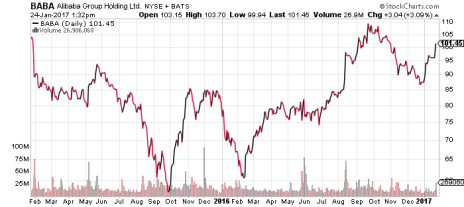Amazon.com (AMZN) has become synonymous with Black Friday and Cyber Monday in the U.S., and its sales typically get a big holiday-quarter boost from those two major shopping holidays. In China, Singles’ Day is their Cyber Monday, only much bigger. This year, it was really big—and that’s been great news for BABA stock.
Alibaba (BABA) is essentially the Amazon of China, and it has held Singles’ Day every November since 2009. Like Cyber Monday, it’s the biggest online shopping day of the year, and the vast majority of it funnels through just one online marketplace.
As usual, Alibaba made a killing, as retailers who peddle their merchandise on its platforms pulled in a record 120.7 billion yuan (or $18 billion) in total sales on November 11, up 32% from last year’s Singles’ Day. For perspective, U.S. shoppers spent $3.45 billion on Cyber Monday, and that was a record by 12.1%.
The record-setting Singles’ Day was part of a monster quarter for Alibaba. Sales improved 54% in its fiscal third quarter, and raised full-year guidance to 54% from 48%. Its e-commerce platform now has more than 450 million mobile monthly active users. But like Amazon before it, Alibaba is becoming much more than just an e-commerce giant.
[text_ad use_post='129628']
Still, online sales are still where Alibaba’s bread is buttered, accounting for 87% of total sales (though that’s down from 92% a year ago). And the enormous Singles’ Day sales have poured gasoline on what was already a smoldering BABA stock fire.
Alibaba stock has jumped 16% in the last month, including a 2.5% jump on Tuesday after the Singles’ Day data was announced. Following a down period in November and December, BABA has since recovered nearly all of those losses. Though BABA stock is actually down slightly (see chart below) in the last two years, it now has plenty of momentum on its side, and is benefiting from the modest rebound in Chinese stocks.
A few years from now, I think that will look like a blip on the radar. Alibaba is where Amazon was 15 years ago, just starting to scratch the surface of its potential to become much more than a mere online marketplace.
The company recently entered the cloud computing business, and its cloud sales have regularly grown by triple digits, improving 115% in the latest quarter. Its digital and entertainment wing is growing even faster, gaining a whopping 273% last quarter. Meanwhile, the company has made the smooth transition from PCs to mobile. Acquisitions of video-streaming website Youku Tudou, e-commerce company Lazada Group and web browser UCWeb have all contributed to Alibaba’s burgeoning mobile presence. Those buyouts have also helped make BABA less dependent on the slowing Chinese economy, giving the company a more global footprint.
But there are two numbers that make me particularly bullish on BABA stock even after its 16% rally in the last month: $16.2 billion and 24. The former is the amount of cash Alibaba has in its coffers even after its recent spending spree—leaving room for more key acquisitions—and the latter is its forward price-to-earnings ratio, which is quite cheap for a company with sales growing this fast. By comparison, AMZN trades at 94 times forward earnings estimates.
Its record Singles’ Day and emphatic earnings beat grabbed a lot of headlines in the U.S. yesterday. To me, though, Singles’ Day and double-digit revenue growth and just two of many reasons to like BABA stock in the coming months and years—especially after two years of no net movement.
In my mind, BABA has shaken off some of the early growing pains after coming public in September 2014, and is just starting to come into its own as one of Wall Street’s next great tech growth stocks.
[author_ad]

